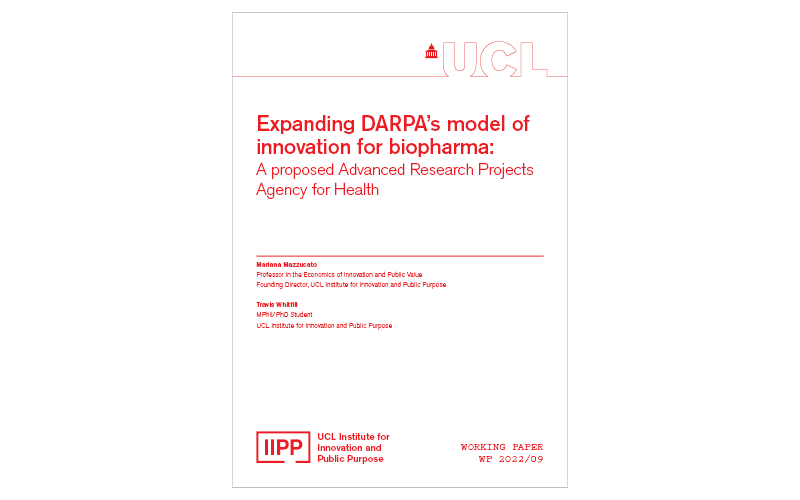Expanding DARPA’s model of innovation for biopharma
This paper proposes approaches for innovation in health to accelerate biomedical innovation and its potential to address public health needs by adopting a mission-oriented approach.

24 June 2022
UCL Institute for Innovation and Public Purpose (IIPP) Working Paper Series: IIPP WP 2022/09
Expanding DARPA’s model of innovation for biopharma: A proposed Advanced Research Projects Agency for Health
Authors:
- Mariana Mazzucato | UCL Institute for Innovation and Public Purpose
- Travis Whitfill | UCL Institute for Innovation and Public Purpose
Reference:
Mazzucato, M. and Whitfill, T. (2022). Expanding DARPA’s model of innovation for biopharma: A proposed Advanced Research Projects Agency for Health. UCL Institute for Innovation and Public Purpose, Working Paper Series (IIPP WP 2020-09). https://www.ucl.ac.uk/bartlett/public-purpose/wp2022-09.
Abstract:
The Defense Advanced Research Projects Agency (DARPA) in the United States (US) funds risky, visionary projects that aim to push the boundaries of current technologies. In biotechnology this has resulted in critical new medicines and vaccines. DARPA has been instrumental in funding nucleic acid-based technologies to fight the COVID-19 pandemic, resulting in the first vaccine and therapeutic authorised for COVID-19 (Moderna’s mRNA-1273 and AbCellera/Eli Lilly’s bamlanivimab, respectively). DARPA funded these technologies before SARS-CoV-2 even emerged. DARPA’s model of innovation could pave the way for more advancements in biotechnology in the future. However, DARPA is underleveraged and financialised biopharma companies have taken government funding to pocket profits for shareholders and executives. Much of this public investment has missed opportunities to be mission-oriented and to co-shape markets to design innovation around health programmes in a purpose-oriented approach to focus on innovation, and access to medicines and vaccines. For example, Moderna’s share prices have risen ~500% since 2020. Additionally, Moderna executives have sold over $800 million in shares since 2020, pocketing record compensation packages. In April 2021, US President Joe Biden called for the creation of a DARPA agency for health — what he named ‘ARPA-H’ (Advanced Research Projects Agency for Health). ARPA-H was formed in April 2022, but was formed under the National Institutes of Health (NIH) and with a fraction of the budget President Biden requested from Congress. Here we give recommendations to steer the new agency towards better health innovation. To both accelerate innovation while limiting biopharma companies’ profit-taking from government funding, ARPA-H should incorporate the following approaches to innovation in health: (1) incorporate an extended pipeline model of innovation as DARPA does; (2) take a mission-oriented approach to fill gaps in biomedical innovation; (3) fund radical innovation; and (4) create conditions on technologies to control drug prices and access. It is critical that ARPA-H accelerates biomedical innovation and it is an opportunity to place much stronger emphasis on public health needs, broaden access to technology, lower pricing, enhance knowledge transfer and connect procurement at an international level.
 Close
Close

